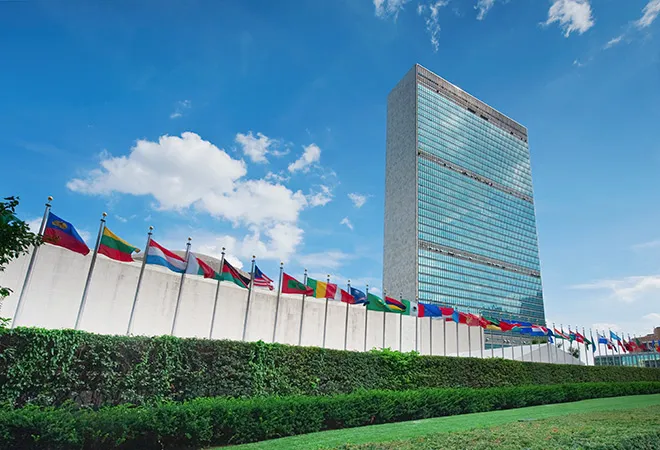Amid the celebrations surrounding the 75th anniversary of the setting up of the United Nations (UN), the global multilateral project is in open disarray. While most nations continue to profess their abiding faith in multilateralism, the institutional manifestations underpinning the extant multilateral order are weakening by the day, crippled under the weight of their internal contradictions. This has perhaps been the most significant fallout on the global order of the covid-19 pandemic.
This irony was highlighted by external affairs minister, S Jaishankar, when he suggested that “just when multilateralism was most in demand, it did not rise to the occasion", despite the fact that “the limitations of purely national responses or sometimes living in denial have become evident." A global health pandemic should have been the high point of the multilateral search for a collective solution. Instead, it has turned out to be its nadir.
In some ways, the crisis of multilateralism should not be surprising. The global order that emerged after the end of World War II was a product of its time. As underlying structural realities shift, the stress is palpable, as various institutions, norms and processes face challenges from multiple directions. Not only is China challenging an order that it believes was created in its absence, but even the US, which was its most important founding father, seems dissatisfied with the status quo. For a liberal order that has arguably been central to maintaining peace and prosperity worldwide for more than seven decades, this growing inability to provide equitable and effective solutions to today’s common challenges signals a remarkable retreat. As it happens, it is this seeming retreat that makes it imperative for nations like India to develop an alternative strategy to secure their interests in a world where great power competition is becoming sharper by the day.
Prime Minister Narendra Modi’s virtual interventions at the UN last month were therefore important not only because they managed to focus on some of the key challenges facing the multilateral order, but also because they underlined a shift in India’s engagement with this question. New Delhi is not simply making a case for a stronger voice in shaping the global order, but it is making it clear that without India, it is the credibility of the UN and the multilateral order that are at stake.
Modi challenged the UN to introspect as a “crisis of confidence" haunts the institution and called for a new template of multilateralism that “reflects today’s reality, gives voice to all stakeholders, addresses contemporary challenges, and focuses on human welfare". Given India’s stint at the UN Security Council as an elected non-permanent member for a two-year term beginning 1 January, 2021, New Delhi was making its priorities clear.
Modi directly targeted the UN for its non-performance during the ongoing crisis when he underlined the absence of the international body over the period that the world had been battling the pandemic. He asked: “Where is the United Nations in this joint fight against the pandemic? Where is its effective response? Reform in the responses, in the processes, and in the very character of the UN is the need of the hour."
And he questioned the viability of the present state of affairs as the leader of a country “which in the course of maintaining peace, has lost the maximum number of its brave soldiers" and where “the faith and respect that the UN enjoys among the 1.3 billion people in India is unparalleled". This led him to his central question: “For how long will India be kept out of the decision-making structures of the United Nations? A country, which is the largest democracy of the world; a country with more than 18% of the world population; a country which has hundreds of languages, hundred s of dialects, many sects, many ideologies; a country which was a leading global economy for centuries and also one which has seen hundreds of years of foreign rule."
When he asked how long a country would have to wait, particularly when the transformational changes happening in that country would affect a large part of the world, the Prime Minister was underscoring growing impatience in India over the pace of reforms at the UN. To many in India, it is not readily evident if the global multilateral order will be able to reform itself and cope with rising geopolitical tensions and new security challenges. Modi’s remarks were a veiled warning to the UN that despite New Delhi’s inherent faith in the global multilateral order, India’s absence from its decision-making structures and lack of genuine reforms might force India to look for alternatives.
This is already beginning to happen. A fractured multilateral framework is the order the day. The security dynamics in the immediate aftermath of World War II were focused on managing Europe and safeguarding its peripheries. Today, it is the Indo-Pacific region that is driving the global economic and political agenda. The context and logic of global institutional frameworks should reflect this shift, especially at a time when a weakening UN is leading to the proliferation of plurilateral and mini-lateral forums. These coalitions of the willing are viewed as more effective and efficient in dealing with not only traditional security issues, but even non-traditional ones like the ongoing covid-19 pandemic.
For a country like India that aims to be a rule shaper, not merely a rule-taker, this is an inflection point. If the extant multilateral order will not work to secure Indian interests, then New Delhi will have to look for alternatives. That process is already underway.
This commentary originally appeared in Live Mint.
The views expressed above belong to the author(s). ORF research and analyses now available on Telegram! Click here to access our curated content — blogs, longforms and interviews.




 PREV
PREV


